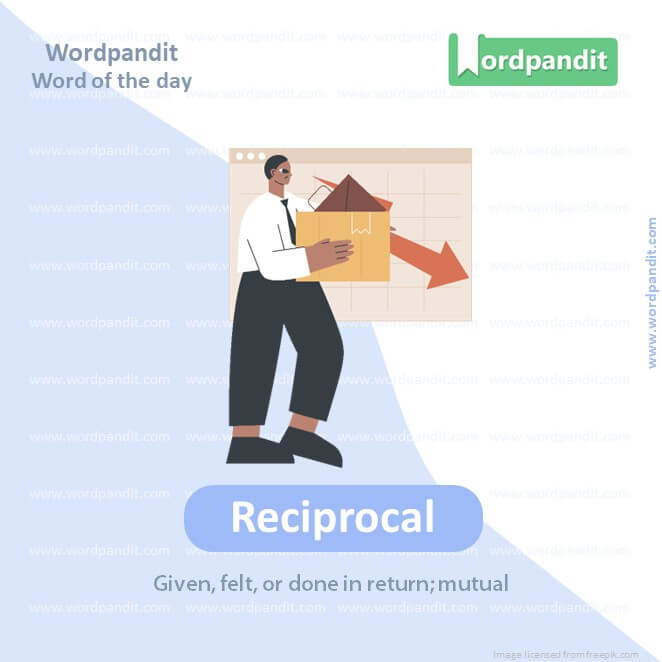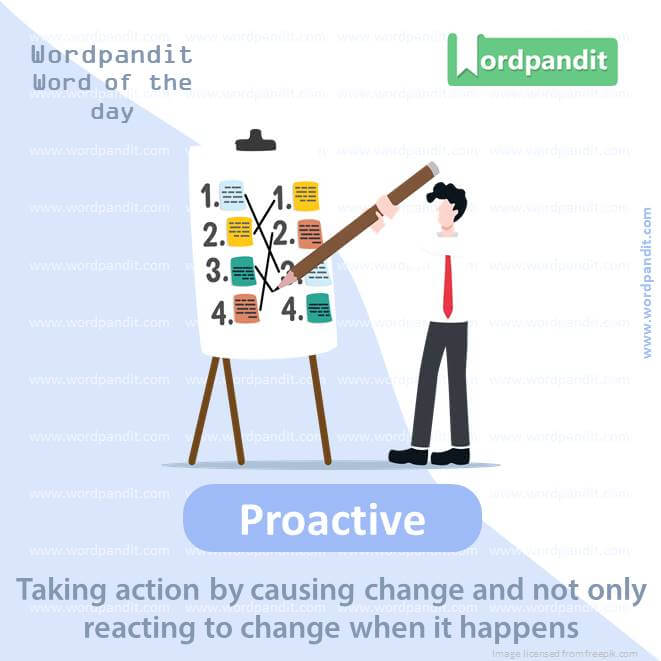Daily Vocabulary Words: List of Daily Used Words in Leading Indian Newspapers
Hi there. Welcome to this special section @ Wordpandit. Our endeavour here is straightforward: highlighting daily vocabulary words that you would come across in leading newspapers in the country. We have included the following newspapers in our selection:
• The Times of India
• The Economic Times
• Hindustan Times
• Mint
• Indian Express
We are putting in extensive work to develop your vocabulary. All you have to do is be regular with this section and check out this post daily. This is your repository of commonly used words; essentially, we are posting a list of daily used words. Hence, this has significant practical application as it teaches you words that are commonly used in leading publications mentioned above.
Visit the website daily to learn words from leading Indian newspapers.

WORD-1: INDELIBLE
CONTEXT: The artist’s contributions have left an indelible mark on the world of contemporary Indian art.
SOURCE: The Times of India
EXPLANATORY PARAGRAPH: Imagine if you drew something with a special marker and no matter how much you tried to erase or wash it, it never went away. That’s what “indelible” means – something that can’t be removed or forgotten.
MEANING: Making marks that cannot be removed;unforgettable (adjective).
PRONUNCIATION: in-DEL-i-bull
SYNONYMS: Permanent, ineradicable, lasting, enduring, unforgettable.
USAGE EXAMPLE:
1. She left an indelible mark on my heart.
2. The ink stain was indelible on the white shirt.
3. His kindness had an indelible impact on the community.
4. The movie had an indelible impression on me.
WORD-2: MASQUERADING
CONTEXT: Several counterfeit products masquerading as genuine branded items were seized during the raid.
SOURCE: The Economic Times
EXPLANATORY PARAGRAPH: “Masquerading” is like playing dress-up and pretending to be someone or something else. Imagine wearing a superhero costume and acting like that superhero.
MEANING: Pretending to be someone or something else, especially to deceive (verb).
PRONUNCIATION: mask-uh-RAYD-ing
SYNONYMS: Pretending, impersonating, disguising, posing, feigning.
USAGE EXAMPLE:
1. He was masquerading as a police officer.
2. The spy was masquerading as a tourist.
3. Many dangers in the internet are masquerading as friendly offers.
4. She spent the evening masquerading as a famous actress.
WORD-3: MURKY
CONTEXT: The murky waters of the river are indicative of the severe pollution levels that have risen over the past decade.
SOURCE: Hindustan Times
EXPLANATORY PARAGRAPH: Think of a pond where the water is so dark and cloudy that you can’t see the bottom. That’s what “murky” means – when something is not clear or it’s dark and cloudy.
MEANING: Dark, gloomy, and not clear (adjective).
PRONUNCIATION: MUR-kee
SYNONYMS: Dark, cloudy, muddy, foggy, hazy.
USAGE EXAMPLE:
1. The water was so murky that I couldn’t see my feet.
2. The room was filled with murky shadows.
3. The details of the plan remained murky.
4. After the rain, the river became murky.

WORD-4: EXPANSIVE
CONTEXT: The company announced its expansive plans to open 100 new stores across the country by the end of the year.
SOURCE: Live Mint
EXPLANATORY PARAGRAPH: “Expansive” is like when you spread your arms wide open, feeling big and wide. It can also mean when someone is very friendly and talks a lot, sharing many things.
MEANING: Covering a wide area in terms of space or scope; extensive or broad (adjective).
PRONUNCIATION: ex-PAN-siv
SYNONYMS: Wide-ranging, broad, extensive, all-encompassing, open.
USAGE EXAMPLE:
1. The property offered an expansive view of the mountains.
2. She had an expansive personality and made friends easily.
3. The desert was an expansive stretch of sand.
4. His expansive knowledge of history impressed everyone.

WORD-5: RECIPROCAL
CONTEXT: India and Japan are in talks to establish a reciprocal travel bubble to facilitate trade and tourism.
SOURCE: Indian Express
EXPLANATORY PARAGRAPH: “Reciprocal” is like when you and your friend exchange toys. If you give a toy to your friend and your friend gives one back to you, that’s a reciprocal action. It’s like a two-way thing.
MEANING: Given, felt, or done in return; mutual (adjective).
PRONUNCIATION: re-SIP-ro-kal
SYNONYMS: Mutual, corresponding, equivalent, complementary, exchanged.
USAGE EXAMPLE:
1. They had a reciprocal agreement to share toys.
2. Respect is a reciprocal feeling in a relationship.
3. The two countries have reciprocal trade deals.
4. His kindness was reciprocal to the help he received.
WORD-6: DEMAGOGUE
CONTEXT: Historians often debate the rise of certain leaders, wondering whether they genuinely believed in their rhetoric or were simply playing the role of a demagogue to gain power.
SOURCE: The Times of India
EXPLANATORY PARAGRAPH: A “demagogue” is like a person who tries to become a leader by making big promises and using strong words, even if they don’t mean to keep those promises. They often try to get people excited or angry to get support.
MEANING: A leader who seeks support by appealing to emotions, prejudices, or popular desires rather than using logical arguments (noun).
PRONUNCIATION: DEM-uh-gog
SYNONYMS: Agitator, rabble-rouser, firebrand, instigator, provocateur.
USAGE EXAMPLE:
1. The demagogue roused the crowd with his passionate speech.
2. Many fear the rise of demagogues in politics.
3. He was criticized for being a demagogue rather than a true leader.
4. History has shown the danger of following a demagogue.

WORD-7: PROACTIVE
CONTEXT: Corporates are urged to adopt a more proactive approach towards sustainability and environmental responsibility.
SOURCE: The Economic Times
EXPLANATORY PARAGRAPH: Being “proactive” is like being a superhero who stops the bad things before they happen. Instead of waiting for problems, a proactive person plans and acts ahead of time.
MEANING: Taking action by causing change and not only reacting to change when it happens (adjective).
PRONUNCIATION: proh-AK-tiv
SYNONYMS: Forward-thinking, anticipatory, preventive, initiative-taking, enterprising.
USAGE EXAMPLE:
1. She was proactive in her approach to work.
2. Taking vitamins is a proactive way to boost health.
3. The teacher encouraged proactive participation in class.
4. Proactive planning can prevent future problems.
WORD-8: CONTEMPLATE
CONTEXT: As the economic downturn persists, many businesses contemplate major shifts in their strategies to stay afloat.
SOURCE: Live Mint
EXPLANATORY PARAGRAPH: “Contemplate” is like when you sit quietly and think deeply about something. Imagine looking at the stars and thinking about the universe.
MEANING: To think deeply or carefully about something (verb).
PRONUNCIATION: KON-tum-playt
SYNONYMS: Ponder, consider, reflect, mull over, meditate.
USAGE EXAMPLE:
1. He sat by the window to contemplate life.
2. Before making a decision, she took a moment to contemplate.
3. Artists often contemplate the beauty of nature.
4. It’s important to contemplate the consequences of our actions.

WORD-9: HAWKISH
CONTEXT: Analysts predict a hawkish stance from the central bank in light of the recent inflationary pressures.
SOURCE: Hindustan Times
EXPLANATORY PARAGRAPH: “Hawkish” is like being like a hawk – strong and aggressive. People use it to describe someone who wants to use force or be aggressive, especially in politics or business.
MEANING: Advocating an aggressive or war like policy, especially in foreign affairs (adjective).
PRONUNCIATION: HAW-kish
SYNONYMS: Aggressive, militant, combative, belligerent, warlike.
USAGE EXAMPLE:
1. The senator had a hawkish stance on defense.
2. The company’s hawkish approach led to rapid expansion.
3. The debate was dominated by the hawkish views of a few.
4. Critics worried about his hawkish policies.
WORD-10: SALVAGE
CONTEXT: Efforts are underway to salvage the historic shipwreck found off the coast, believed to be from the Mughal era.
SOURCE: Indian Express
EXPLANATORY PARAGRAPH: “Salvage” is like when you have a broken toy and instead of throwing it away, you find parts of it that are still good and use them for something else. It’s like saving the good parts from something that’s damaged or not working.
MEANING: To save or recover something, especially from a bad situation or condition (verb).
PRONUNCIATION: SAL-vij
SYNONYMS: Retrieve, recover, rescue, reclaim, save.
USAGE EXAMPLE:
1. After the flood, they tried to salvage their belongings.
2. The team managed to salvage a draw from a losing position.
3. She was able to salvage some important files from the damaged computer.
4. Efforts were made to salvage the sunken ship.







